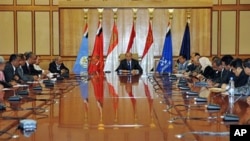Yemen’s President Ali Abdullah Saleh flew to Saudi Arabia on Saturday for treatment of wounds sustained in an attack on the presidential palace the day before. His departure sparked waves of jubilation among Yemenis, who have been agitating for him to step down. The unrest in Yemen and his departure - whether temporary or permanent - has sparked uncertainty over counter-terrorism efforts against the Yemen-based al-Qaida in the Arabian Peninsula.
Former U.S. ambassador to Yemen Barbara Bodine said Saleh’s flight to Riyadh appears to have been for legitimate medical treatment and was not part of a negotiated departure.
"I do not think he would have gone to Saudi Arabia for medical treatment unless he absolutely needed it," she said. "I think he’s smart enough to know that, having left, coming back is going to be very difficult, yes. It is a lot easier to hold on to power if you are there and it is really hard if you have to come back. But I do not think that in his mind he has abdicated."
But analysts say his departure, whether temporary or permanent, is something of a blow to U.S.-led counter-terrorism efforts.
Yemen is home to what is generally agreed to be the most potent offshoot of Osama bin Laden’s original al-Qaida - al-Qaida in the Arabian Peninsula, or AQAP. Kate Nevens, director of the Middle East and North Africa Program at the British think tank Chatham House, said Saleh skillfully parlayed fears of terrorism into aid and support.
"The U.S. administration has been pouring money into Saleh’s family, into his son Ahmed and his nephew Yahya, to run elite counter-terrorism units in Yemen," said Nevens. "This transition means that Saleh’s family lose power, the U.S. will lose their counter-terrorism allies and will have to renegotiate some kind of deal in Yemen. Whether al-Qaida in Yemen will be able to take advantage of this remains to be seen, I think."
Under Saleh’s rule, the United States has ramped up its drone attacks on suspected AQAP targets in Yemen. But, as Bodine points out, the drone attacks cannot happen without targeting help from Yemeni authorities.
"Drone attacks, which look like the ultimate unilateral action, require an enormous amount of current, accurate human intelligence," she said. "And that has to come from the Yemenis, as much as from our guys, trying to figure out where are the bad guys so that you can hit them. So we are dependent on this situation stabilizing in order to really gear up again our counter-terrorism efforts."
The counter-terrorism situation is further complicated by the fact that the conflict in Yemen has multiple facets and sides. There not only is the struggle between the government and the demonstrators in the streets, but the power battle between political elites as defined by the president and the tribal leaders. Nevens said that means there will be no single, clean transition of governmental power.
"I think what we are seeing is not so much a power vacuum, but we are going to be seeing a cycle of transitions - cycles of transitions," she said. "We are not looking at a situation where we are going to get a clean, decisive shift in power. We are looking at a fight between elite factions that could go on for some time, where they negotiate between themselves. We are talking the highest level of politics in Yemen, where they negotiate various power deals.
Bodine said that does not necessarily mean U.S. officials must start all over again in building new relations in Yemen.
"We do have relations with people in the government, in civil society, in the opposition parties, well beyond Saleh," said Bodine. "It is not a cold start for us. But there is going to be a process, as much on their side as they get into their new jobs, their new functions, to decide what they want to do and what their priorities are that we are going to have to calibrate to fit."
The current temporary leader is Vice-President Abd al-Rab Mansur Hadi. But analysts say his staying power is questionable because of his long and close association with Saleh, who appointed him vice-president in 1994.
Were Saleh to resign, the Yemeni constitution requires a new presidential election within 60 days.
Yemen Unrest Complicates Anti-Terrorist Effort
- By Gary Thomas
















